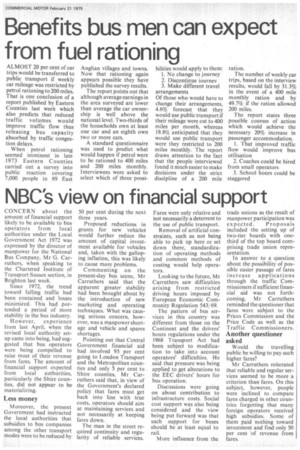Benefits bus men can expect from fuel rationing
Page 25

If you've noticed an error in this article please click here to report it so we can fix it.
ALMOST 20 per cent of car trips would be transferred to public transport if weekly car mileage was restricted by petrol rationing to 200 miles. That is one conclusion of a report published by Eastern Counties last week which also predicts that reduced traffic volumes would improve traffic flow thus releasing bus capacity absorbed by traffic congestion delays.
When petrol rationing seemed imminent in late 1973 Eastern Counties carried out a survey into public reaction covering 7,000 people in 89 East Anglian villages and towns. Now that rationing again appears possible they have published the survey results.
The report points out that although average earnings in the area surveyed are lower than average the car ownership is well above the national level. Two-thirds of the households own at least one car and an eighth own two or more cars.
A standard questionnaire was used to predict what would happen if petrol were to be rationed to 400 miles and 200 miles monthly. Interviewees were asked to select which of three possi bilities would apply to them: 1. No change to journey 2. Discontinue journey 3. Make different travel arrangements Of those who would have to change their arrangements, 4.6% forecast that they would use public transport if their mileage were cut to 400 miles per month, whereas 19.8% anticipated that they would use public transport were they restricted to 200 miles monthly. The report draws attention to the fact that the people interviewed found it much easier to make decisions under the strict discipline of a 200 mile ration.
The number of weekly car trips, based on the interview results, would fall by 31.3% in the event of a 400 mile monthly ration and by 49.7% if the ration allowed 200 miles.
The report states three possible courses of action which would achieve the necessary 20% increase in passenger accommodation.
L That improved traffic flow would improve bus utilisation 2. Coaches could be hired from small operators 3. School hours could be staggered












































































































